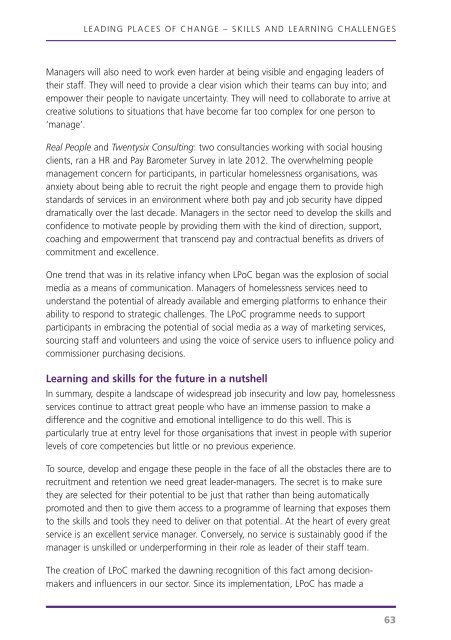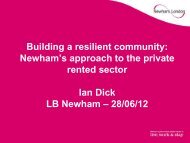View publication - Chartered Institute of Housing
View publication - Chartered Institute of Housing
View publication - Chartered Institute of Housing
You also want an ePaper? Increase the reach of your titles
YUMPU automatically turns print PDFs into web optimized ePapers that Google loves.
LEADING PLACES OF CHANGE – SKILLS AND LEARNING CHALLENGES<br />
Managers will also need to work even harder at being visible and engaging leaders <strong>of</strong><br />
their staff. They will need to provide a clear vision which their teams can buy into; and<br />
empower their people to navigate uncertainty. They will need to collaborate to arrive at<br />
creative solutions to situations that have become far too complex for one person to<br />
‘manage’.<br />
Real People and Twentysix Consulting: two consultancies working with social housing<br />
clients, ran a HR and Pay Barometer Survey in late 2012. The overwhelming people<br />
management concern for participants, in particular homelessness organisations, was<br />
anxiety about being able to recruit the right people and engage them to provide high<br />
standards <strong>of</strong> services in an environment where both pay and job security have dipped<br />
dramatically over the last decade. Managers in the sector need to develop the skills and<br />
confidence to motivate people by providing them with the kind <strong>of</strong> direction, support,<br />
coaching and empowerment that transcend pay and contractual benefits as drivers <strong>of</strong><br />
commitment and excellence.<br />
One trend that was in its relative infancy when LPoC began was the explosion <strong>of</strong> social<br />
media as a means <strong>of</strong> communication. Managers <strong>of</strong> homelessness services need to<br />
understand the potential <strong>of</strong> already available and emerging platforms to enhance their<br />
ability to respond to strategic challenges. The LPoC programme needs to support<br />
participants in embracing the potential <strong>of</strong> social media as a way <strong>of</strong> marketing services,<br />
sourcing staff and volunteers and using the voice <strong>of</strong> service users to influence policy and<br />
commissioner purchasing decisions.<br />
Learning and skills for the future in a nutshell<br />
In summary, despite a landscape <strong>of</strong> widespread job insecurity and low pay, homelessness<br />
services continue to attract great people who have an immense passion to make a<br />
difference and the cognitive and emotional intelligence to do this well. This is<br />
particularly true at entry level for those organisations that invest in people with superior<br />
levels <strong>of</strong> core competencies but little or no previous experience.<br />
To source, develop and engage these people in the face <strong>of</strong> all the obstacles there are to<br />
recruitment and retention we need great leader-managers. The secret is to make sure<br />
they are selected for their potential to be just that rather than being automatically<br />
promoted and then to give them access to a programme <strong>of</strong> learning that exposes them<br />
to the skills and tools they need to deliver on that potential. At the heart <strong>of</strong> every great<br />
service is an excellent service manager. Conversely, no service is sustainably good if the<br />
manager is unskilled or underperforming in their role as leader <strong>of</strong> their staff team.<br />
The creation <strong>of</strong> LPoC marked the dawning recognition <strong>of</strong> this fact among decisionmakers<br />
and influencers in our sector. Since its implementation, LPoC has made a<br />
63

















